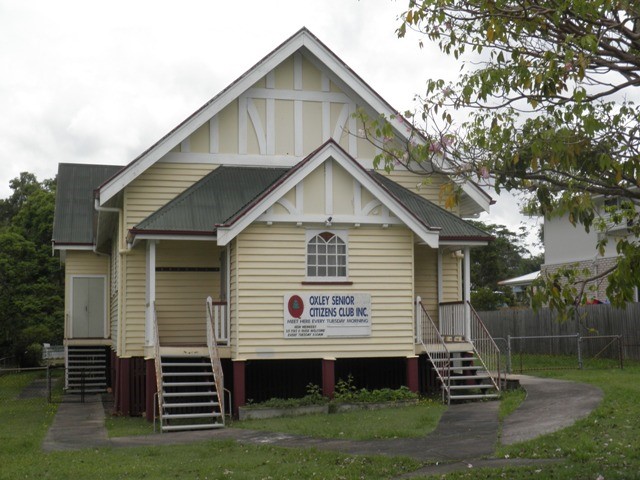Addresses
Type of place
Hall
Period
Interwar 1919-1939
Style
Carpenter Gothic
Addresses
Type of place
Hall
Period
Interwar 1919-1939
Style
Carpenter Gothic
The Oxley Methodist Hall was built in 1930 by the Oxley Methodist community in response to the spiritual needs of the community. The modest timber hall was built at a time of increased settlement in the Oxley area and became the preaching centre for the Methodist congregation of the Oxley district in this period. The funds for the construction of the church hall were raised by the Methodist community. As the first Methodist Church hall in Oxley it holds historic significance to Oxley.
Lot plan
L25_RP29509; L24_RP29509
Key dates
Local Heritage Place Since —
Date of Citation —
Criterion for listing
(A) Historical; (D) Representative; (G) SocialInteractive mapping
Lot plan
L25_RP29509; L24_RP29509
Key dates
Local Heritage Place Since —
Date of Citation —
Criterion for listing
(A) Historical; (D) Representative; (G) SocialInteractive mapping
History
By the late nineteenth century Oxley had two main areas of development. The first was along Ipswich Road where the hotel had been established. Businesses such as a store, a butcher and a blacksmith shop were established as the population slowly increased and the need for services arose. In 1864 a non-denominational church was built near the corner of Bannerman and Ipswich Roads and the first Oxley school was built in 1873 with 32 enrolments when opened. This area became known as Oxley Central. The second area of development in Oxley was beside the railway station. However, this was slower to develop commercially than the first. Further development occurred in Oxley in the interwar period with new businesses being established beside the railway station.
Prior to the construction of the Oxley Methodist Church hall the Oxley Methodist community attended services and events at the Oxley Progress Hall, the Darra Methodist Church or the Graceville Methodist hall. In the mid-1920s the Oxley Methodist community began to raise money for the construction of a new church hall to be used for services, Sunday school and Church events. In 1927 a thirty-two perch block of land was purchased along Oxley Station Road by the Oxley Methodist community, the trustees were George Iredale Bourne, Edwin Proctor and William Brown.
A continued fund-raising effort conducted by the Oxley Methodist community soon had raised enough money for the construction of the hall. Events such as fetes and concerts were organised. On Monday 13 October 1930 The Brisbane Courier published an article ‘Church Activities: Oxley Stump Capping’. The ceremony was to celebrate the commencement of construction of the timber building. The ceremony was attended by respected Methodist community members including Reverend A. A. Mills, President of the Methodist Conference, Reverend J. A. Heaton, ex-President of the Methodist Conference, Reverend R. P. Pope, secretary of the Methodist Conference, Reverend H. Ralph Heaton, minister in charge of the circuit, as well as other dignitaries including Mr. Nimmo, M. L.A and Walter Taylor.
The cost of construction of the new hall was estimated to be approximately £600. The report in The Brisbane Courier stated, “The building which is being erected primarily as a Sunday school hall, will be of wood, with a gable roof, and will measure 48ft. by 26 ft. There will be a vestibule porch, approached by double steps. The structure will be lined and ceiled …the floor of hardwood, crow’s ash, and stringy bark boards alternating, and the windows are to be of arctic glass”.1 In October, 1930 the Church hall was recorded in the Register of New Buildings. The estimated cost of the work was £590; the builder was Mr Gregory of Nundah.
On Saturday 17 January, 1931 the Oxley Methodist Church hall was officially opened. The opening ceremony was attended by the Oxley Methodist community and officials as well as the Lord Mayor, Alderman W. A. Jolly. The Lord Mayor commented “on the remarkable progress of the Oxley district during the last 10 years, adding that he regarded the erection of the Methodist Church Hall as one of its coping stones”.2 The cost of the hall once completed exceeded the initial estimate, “the amount raised for the building fund since February 1926, was £458/19/8, and £853 had been spent on the property - £132 for the land, £590 on the hall, and £131 for furniture.”2
Once completed the Oxley Methodist Church hall became the preaching centre for the Methodist Church community in the district. The hall is historically significant to Oxley as an interwar timber ecclesiastical building constructed by the Oxley Methodist community in response to the increased settlement in Oxley and the need for adequate spiritual centres.
Statement of significance
Relevant assessment criteria
This is a place of local heritage significance and meets one or more of the local heritage criteria under the Heritage planning scheme policy of the Brisbane City Plan 2014. It is significant because:
References
-
The Brisbane Courier, Monday 13 October 1930, p.3
-
The Brisbane Courier, Thursday 22 January 1931, p.19
-
The Brisbane Courier, Thursday 22 January 1931, p.19
-
Donald Watson and Judith McKay, Queensland Architects of the Nineteenth Century, South Brisbane: Queensland Museum, 1994
-
Judy Gale Rechner, Brisbane House Styles 1880 to 1940: a guide to the affordable house, Brisbane: Brisbane History Group Studies No. 2, 1998
-
Historic Titles, Department of Environment and Resource Management
-
Queensland Post Office Directories
-
Metropolitan Water and Sewerage Survey Map
-
Rev R S C Dingle ed Annals of Achievement: A Review of Queensland Methodism 1847- 1947, Queensland Book Depot, Brisbane, 1947
-
Jenkins, Lesley, A Celebration of Culture: A Social History of Darra, Living in Brisbane, 2003
-
Fones, Ralph, Oxley! A Mind of its Own, Oxley-Chelmer History Group, 2006
-
Grantham, Lona, Heritage Tour: An Historical Tour of Oxley, Oxley-Chelmer Historical Group, 2003
-
The Brisbane Courier, Monday 23 September 1929, p.9
-
The Brisbane Courier, Saturday 9 November 1929, p.14
Citation prepared by — Brisbane City Council (page revised June 2022)

